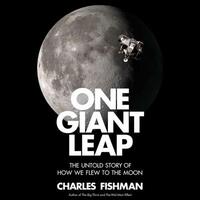Take a photo of a barcode or cover
informative
slow-paced
It was very long and it didn't hold my interests
Lots of cool information. I listened to it, so had a hard time following the narrative, and found the timeline jumped a lot. Would have been nice in chronological order.
adventurous
informative
reflective
medium-paced
informative
slow-paced
Well done and well researched. There’s a lot of detail here, specifically that hundreds of thousands of wires were weaved together to allow the computer system to function, with lots of fascinating details from the individual missions. At times it felt a bit repetitious, but certainly recommended.
adventurous
hopeful
informative
inspiring
reflective
slow-paced
informative
inspiring
medium-paced
This was a fantastic read. As a 30-something, the Apollo program is mythologized as “the good old days” when America was leading the world. This book wastes no time in slaying that rosy-tinted outlook by putting the program in its historical context.
The author shows how even Kennedy, the man who launched the race to the moon, was only for the program as a way to beat the soviets. At the time, America was seeing the Russians accomplish feat after feat, launching Sputnik and achieving many space “firsts.” Meanwhile, America could hardly get its rockets off the pad with disaster after disaster. We were mired in Vietnam and the cultural changes of the 60s were upending “normal” social life at home. Americans were worried that Communism as a way of governance was proving to be better than capitalism, and Kennedy only wanted the moonshot as a way to prove the determination and resilience of Americans.
Even though history looks back on Apollo kindly now, the author shows how support was tenuous at best even during the height of the program, and support for space exploration quickly faded as soon as it was clear we had beaten the Soviets. The momentum of success quickly faded and the organizational learnings squandered.
But as the author notes, Apollo’s legacy wasn’t just a few expensive trips to the moon to gather moon rocks. The process of solving the challenges of space travel and reliably sending humans (as opposed to robots) there and back basically created the world of modern computing. It pumped millions of dollars in projects to every state in the nation. It kicked off massive projects around the world that would support other operations far into the future, like NASA’s worldwide ground-based spaceship tracking system. Even the physics of space travel were poorly understood. To paraphrase the author, it’s hard to overstate how unprepared NASA was for a moon landing at the moment Kennedy gave them less than a decade to do so.
The Apollo program was certainly expensive, but unlike America’s adventures in Vietnam (which as the author notes cost roughly six times as much), Apollo was a force for galvanizing the country and inspiring future scientists around the world. This book does a great job of explaining just what an impressive and unlikely accomplishment it really was.
The author shows how even Kennedy, the man who launched the race to the moon, was only for the program as a way to beat the soviets. At the time, America was seeing the Russians accomplish feat after feat, launching Sputnik and achieving many space “firsts.” Meanwhile, America could hardly get its rockets off the pad with disaster after disaster. We were mired in Vietnam and the cultural changes of the 60s were upending “normal” social life at home. Americans were worried that Communism as a way of governance was proving to be better than capitalism, and Kennedy only wanted the moonshot as a way to prove the determination and resilience of Americans.
Even though history looks back on Apollo kindly now, the author shows how support was tenuous at best even during the height of the program, and support for space exploration quickly faded as soon as it was clear we had beaten the Soviets. The momentum of success quickly faded and the organizational learnings squandered.
But as the author notes, Apollo’s legacy wasn’t just a few expensive trips to the moon to gather moon rocks. The process of solving the challenges of space travel and reliably sending humans (as opposed to robots) there and back basically created the world of modern computing. It pumped millions of dollars in projects to every state in the nation. It kicked off massive projects around the world that would support other operations far into the future, like NASA’s worldwide ground-based spaceship tracking system. Even the physics of space travel were poorly understood. To paraphrase the author, it’s hard to overstate how unprepared NASA was for a moon landing at the moment Kennedy gave them less than a decade to do so.
The Apollo program was certainly expensive, but unlike America’s adventures in Vietnam (which as the author notes cost roughly six times as much), Apollo was a force for galvanizing the country and inspiring future scientists around the world. This book does a great job of explaining just what an impressive and unlikely accomplishment it really was.
The timeline was a little weird to me, but a lot of good information on all the technological advances and scientific discoveries that led to the Apollo missions and how its affected our lives on Earth.


